Hunter Blair
An Auckland Punk Band Toured Japan. This Is What Went Down.
Auckland punks Cindy toured around Japan with their idols King Brothers, and Kiwi photographer Hunter Blair was there to capture it all
You never forget the first time you see Cindy play: it’s a cloudy night in June of last year, deep in the bowels of Tāmaki Makaurau’s Whammy Bar. It’s Te Tīmatanga – The Beginning, a Matariki celebration featuring Māori musicians from around Aotearoa.
Everyone on the bill sounds great in their own way, the unusual twin-stage setup inside Whammy meaning acts have punishingly little time to impress the crowd, their heads turning almost at a rate usually only seen at tennis rallies to follow the noise.
Then it’s Cindy’s turn and what’s been up to this point a shared bill, each artist on equal footing, becomes a sudden headline show. The crowd seems to swell to double its size as frontman Scot Brown decides to incessantly throw his small frame – with mere briefs covering his body – off the stage, as his band puts on the type of ferocious punk performance that imprints indelibly on the mind.
Unless you frequent venues like Raglan’s Yot Club or Hamilton’s Last Place or Whammy, it makes sense that you haven’t heard of Cindy. The Auckland punk rock band are old school – refreshingly so – in a way that often feels like it’s dying out completely, presumed by others to be near-obsolete. Aside from a smattering of releases here and there, there’s precious little about them to be discovered digitally; their monthly listeners on Spotify would barely fill a community hall. But they are the type of unpretentious, if-you-know-you-fucking-know, resolutely DIY band that rewards discovery.
Every city has a Cindy, a group of hard-working musicians who completely forego chasing virality in favour of building vitality, who disregard the data that controls – constricts – today’s music industry, intent instead on just playing music as much as possible.
How did Auckland’s Cindy, then, end up on a tour of Japan this year? A glimpse of an answer was given that night in June 2022. Everything the band threw at the Whammy crowd went down a storm, but the clear highlight was a rousing cover of “Get Away”, one of Japanese rock band King Brother’s most formidable songs. (Cindy have been covering it since at least 2018, when they played it on 95bFM Drive Island.)
“I love you, I love you, I love you, I love you,” Scot screeched, seemingly into infinity, as lost in the words as the first time he sung them. This was no throwaway cover, was the suggestion by the passion in the performance; this was a howled homage, a tribute to a major inspiration.
Love Music?
Get your daily dose of everything happening in Australian/New Zealand music and globally.
So when King Brothers came all the way from Nishinomiya to Auckland to celebrate their 25th anniversary earlier this year, of course Cindy were following as support. A few months later, the roles reversed, Cindy – Scot, Jordan Lim, Jame King, and Gloria Florence – heading to Japan to play a run of shows alongside King Brothers and other local rock bands – Kingons and Wasurete Motels – perhaps searching for a DIY rock music landscape as unheralded and unrestrained as they’d prefer it.
New Zealand-born, Melbourne-based photographer Hunter Blair went along for the ride, “documenting the good, bad, and ugly.”
He had known Cindy for a long time before the tour, and he also felt an affinity with the band from the very first time he saw them play live. “I loved that they were different. Cindy were cool. I know that’s not overly profound, but I struggle to find an adjective more fitting,” he says. “It stood out to me because no one else in the country played the way they did. Sure, there were nosier bands. There were more talented bands. There were bands with a better “look” – but no one could do what Cindy could. I never understood why until I got to Japan.”
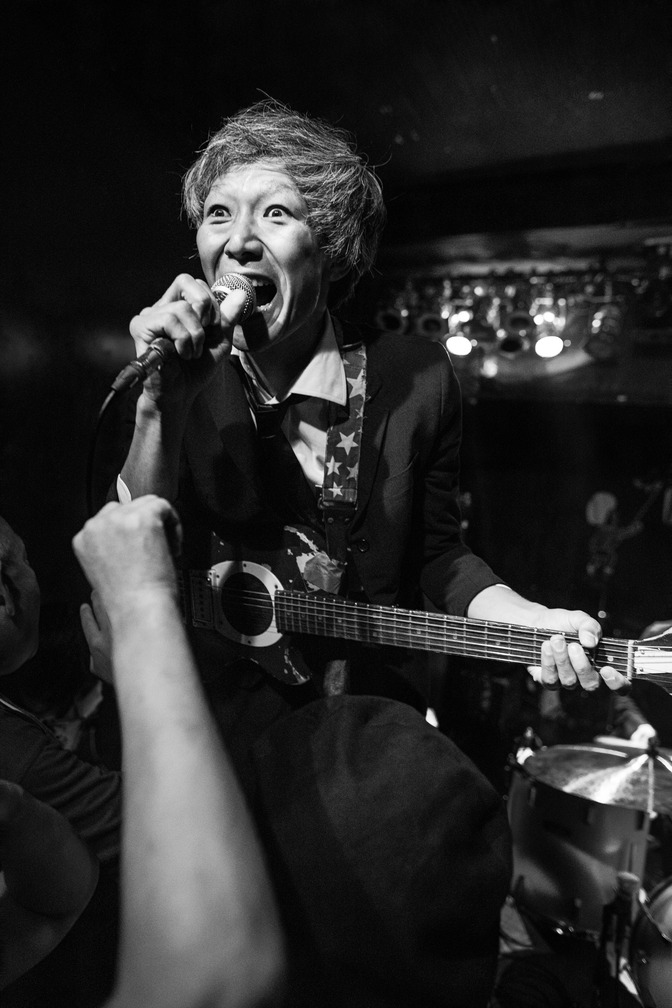
Credit: Hunter Blair
Hunter quickly realised that Cindy weren’t heading to Japan to mess around. “What stuck out to me immediately was the poise and professional nature of each act,” he recalls. “There was a necessity for a routine to prevail, even amongst the chaos of travel and rock ‘n’ roll. Each show had timings down to the minute; the acts for that evening getting in and out for soundcheck with military-like accuracy.
“The nerves were palpable. For each member of Cindy, they had taken time off work, spent hard-earned money, travelled a long way to be here. There was no time to practice prior to the show, no real warm up bar a frantic soundcheck.
It all came together in the end. Cindy and Hunter were immediately ingrained into the tour by their hosts. “We gathered into a room backstage, all six acts for that evening plus a few hangers-on (friends, family, photographers etc). I wasn’t very aware of what was happening, but it became apparent we were being welcomed to Japan. Each member came up to Cindy and myself to shake hands, clink drinks, and welcome the bands to the tour. There was unity – you were part of a group who had chosen to live their lives as outcasts.
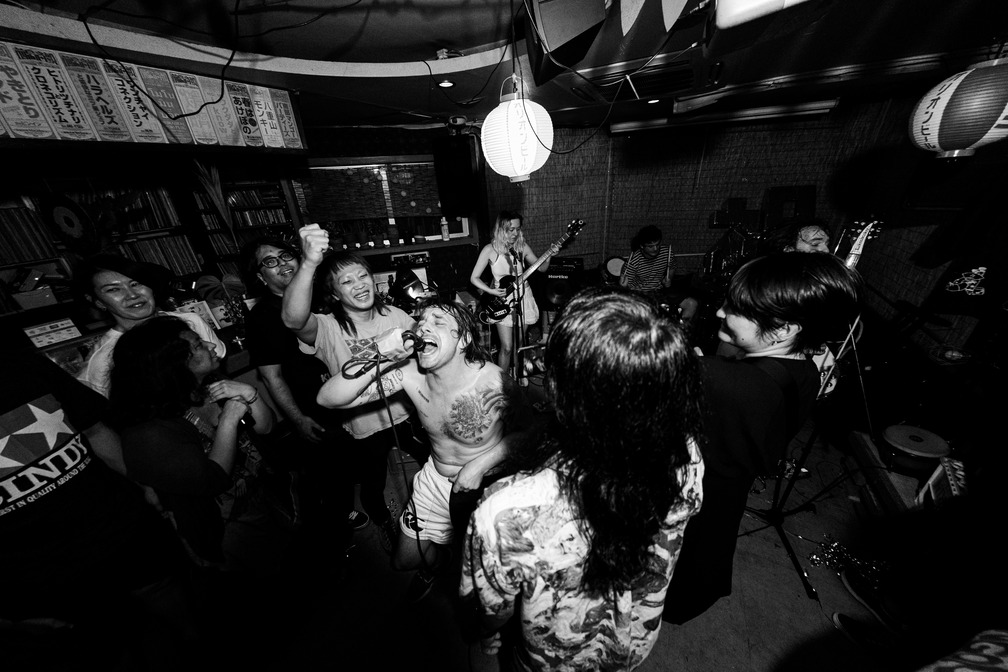
Credit: Hunter Blair
The inclusive nature of the tour wasn’t lost on the photographer. “During previous tours of NZ, I’ve watched supporting bands come and go. Some choose to engrain themselves deeply into proceedings, others choose to shy away. However in Japan, this wasn’t an option. Everyone hung out with everyone. It meant you stood strong for the person next to you.
From city to city – Tokyo t0 Nagoya to Osaka – the travelling Kiwis were blown away by the kindness of the Japanese people. “The collective body of people in each venue moved as one – respect and privacy was afforded to even the most timid of audience member,” Hunter explains. “There was a place for everyone to enjoy and thrive in their own personal enclave. The thing that also stood out to me, particularly as a photographer, was the smiles. Everyone was happy – no one was too cool to smile.
But according to Hunter, pursuing punk rock in Japan is “a brave decision.”
“It’s not like these acts were completely shunned from everyday life, but it was impossible not to notice the stares or condemnation from members of the general public,” he says.
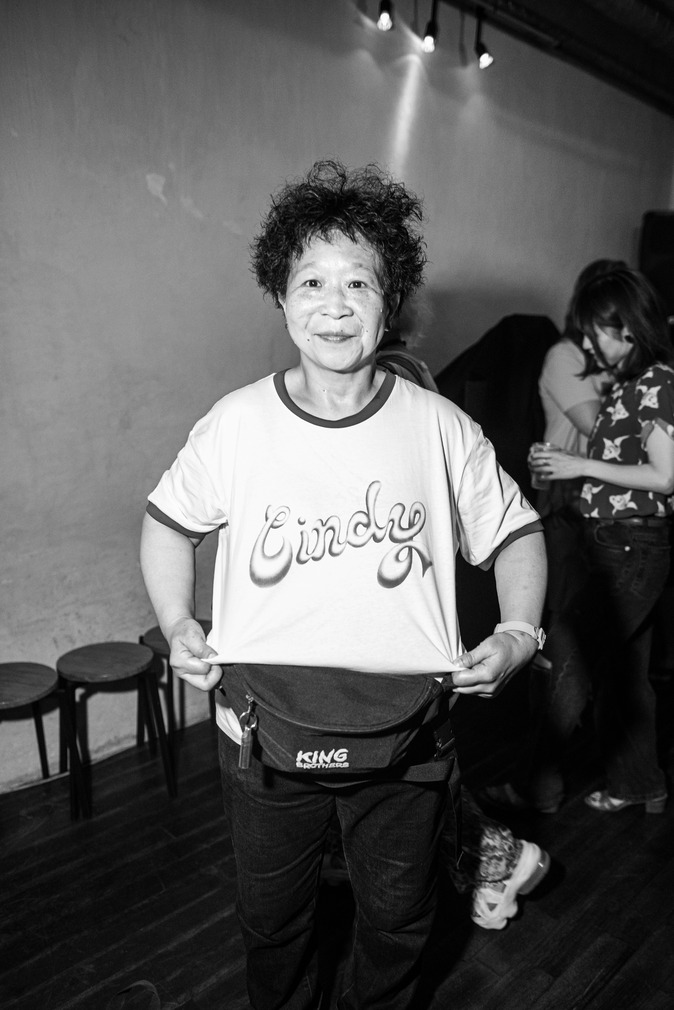
Credit: Hunter Blair
Cindy’s tour took them to places not visited by other touring bands in Japan, particularly Okinawa. “The route would be Tokyo, Nagoya, Osaka, and then maybe a smattering of shows across Kyoto, Kobe, Hiroshima etc. But for whatever reason, Okinawa became the preference, presumably because of the heatwave Japan had been experiencing and Okinawa’s beach holiday reputation. This was probably the highlight of the trip. As a keen history nerd, Okinawa represented a totally unique socialscape. The island was unique in everything from its food, architecture, way of life, mannerisms etc.
“The shows were in three different locations across the island – each brought their own respective flavour to the tour. What we were quick to discover was the same sense of safety for alternative ways of thinking. People were different here – more had tattoos, more people liked alternative music, there was a bigger rallying behind the unorthodox. Dive bars would play 80’s B movies while rare tape demos of undiscovered bands would echo off each wall.
“This could have been slightly to do with proximity bias – we were meeting people who already knew of the tour and frequenting restaurants, bars, venues, shops etc that fit this mould – but even those outside of the tour seemed to be more accepting of what would otherwise go against the grain on the mainland.”
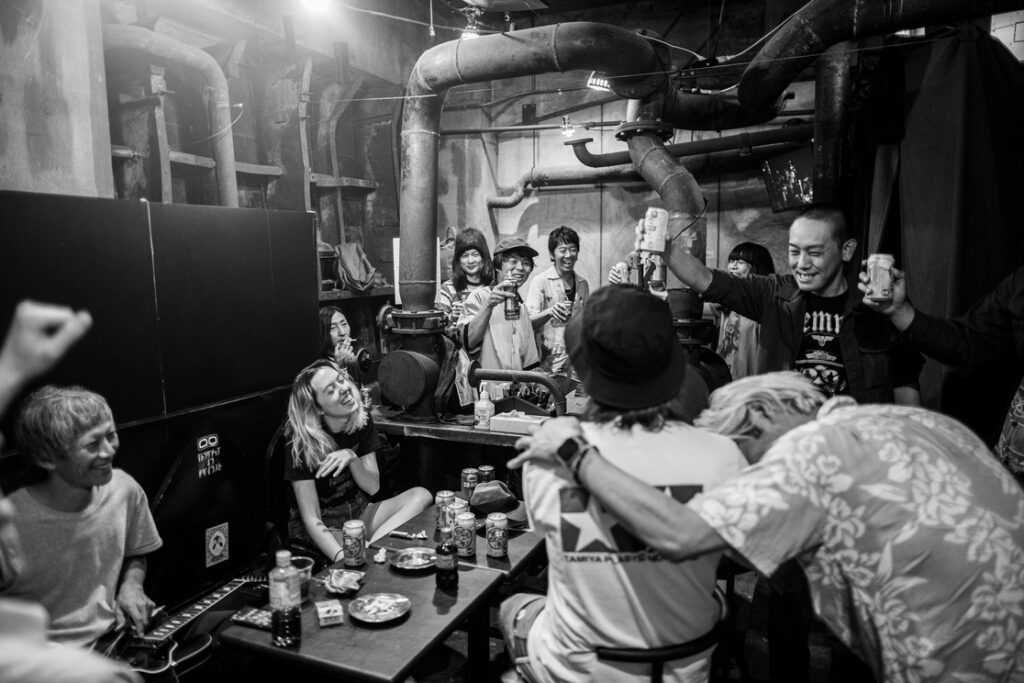
Credit: Hunter Blair
According to Scot, the whole experience hasn’t sunk in yet. “While you’re away, you’re operating on adrenalin the whole time. The cool part about this tour was we went to Okinawa and got to bring some bands down from the mainland. We would have had bigger shows on the main island, but it was fucking rad to play the smaller venues and do all of the little shit.
It was far from Scot’s first time in the country, though. “I’ve got a lot of friends there from touring with other bands,” he says. “I think this was my seventh, sixth or seventh, tour to Japan. Having a foot in the door to that scene just means there is potential for more opportunities.
“The place is just different, too. I personally pick up a different aspect of being a musician. Different ways people do the same thing. I’ve always idolised bands like King Brothers, but for what they do off the stage as well as on it. I’ve known them since I was about 15 and first heard “Lulu” back on Myspace. And ever since, with all of the bands, not just KB, I try to find little bits to take for me.”
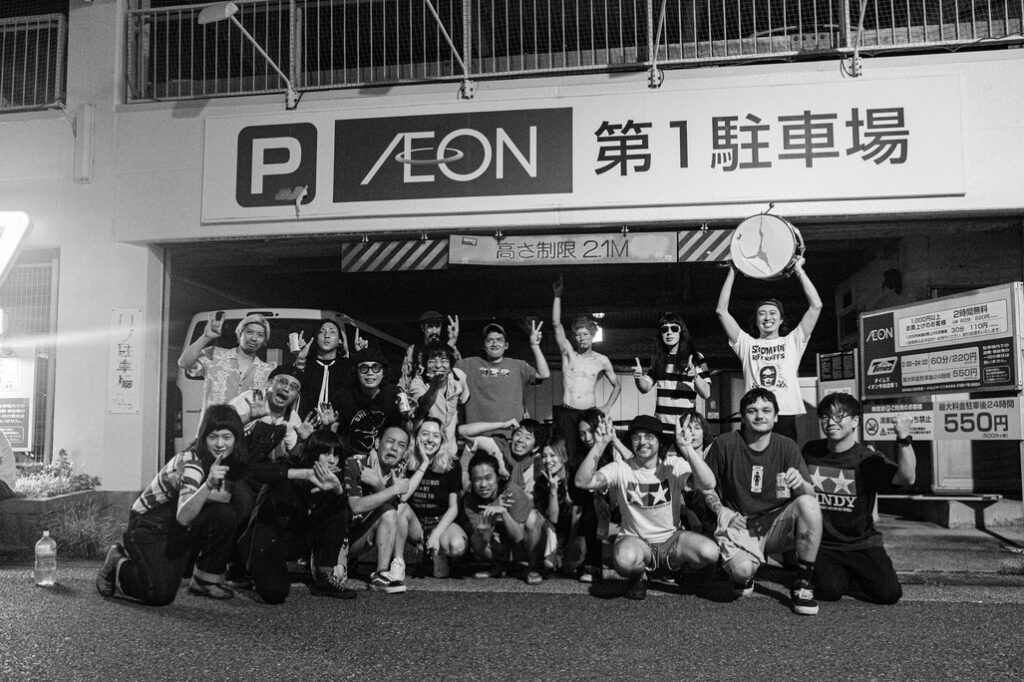
Credit: Hunter Blair
This is how Hunter remembers the experience: “two weeks of unrefined chaos.”
“I’d only ever been to Japan in my imagination; it was a country I thought I had already discovered through pop culture,” he says. “What I ended up finding was the preservation of authenticity. Japan became a refreshing reprise for artistry. Each band were stoic believers in what they brought to the scene. This was a way of life. A conscious choice to not only be a musician, but to exist outside of the “norm.”
“The scene thrives on participation – streaming services such as Spotify have no place here. If you want to listen to your favourite band, buy their CD; if you want to hear an unreleased song, go to the show. To witness Cindy in this context made a lot sense as to why Scot runs the band the way he does.
“There is a structure and importance placed in the engagement of their audience. Presumably why Cindy still don’t have a fully realised record to their name – because yes, that’s great, but what’s good about a record if you have no one coming to see it being played? Japan has clearly had a profound impact on Scot and how he conducts himself as a performer.”
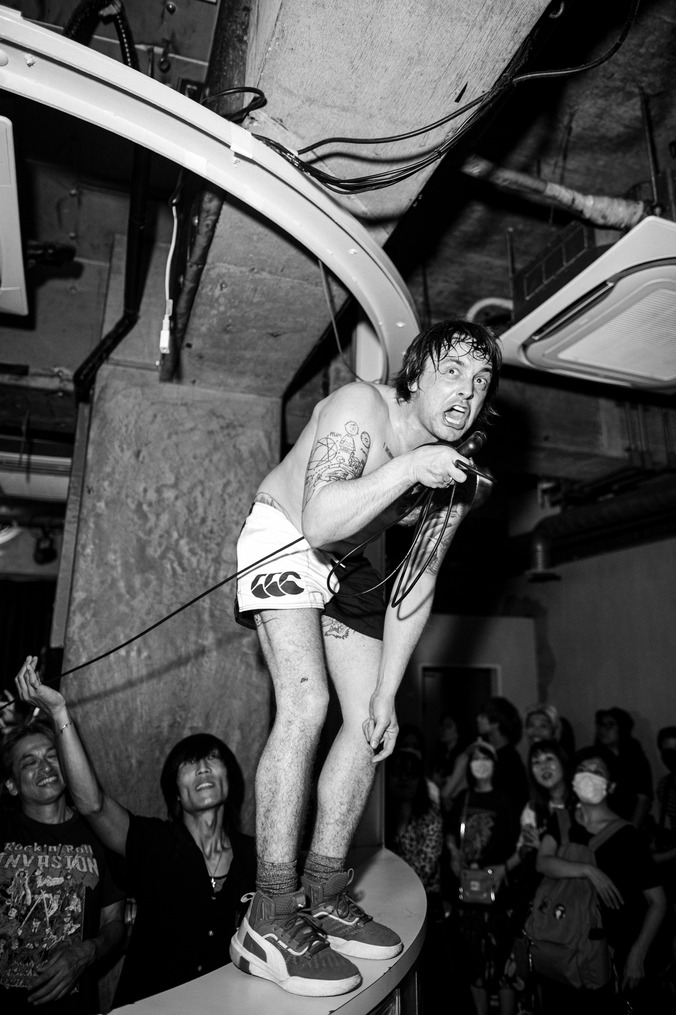
Credit: Hunter Blair
And Japan should expect to see Cindy again soon enough. “We’re in the process of recording the next project,” Scot explains. “It’d be good to get some stuff out then look at touring again. All sorts of places too – NZ, Japan, and other countries. It’s usually dumb to tour without an LP under the belt – I’ll do it but I guess that’s the whole purpose of touring! Not having a record is holding us back a bit, so we’re keen to get something done.
“This was a near perfect tour for us. We did everything we already do back in NZ, but got to bring it to Japan – which is mean because we’ve been doing this for fucking ages.”





































